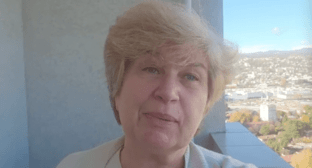23 December 2003, 14:00
Chechen intelligentsia discussed republic's prospects for peace
The round table "Peace Process: Myth or Reality" was held by the Chechen intelligentsia in Grozny on December 19. The aim of the event organized by the Lam cultural center was to discuss changes in the political situation in the aftermath of the presidential and State Duma elections in Chechnya.
"When people talk about the peace process in Chechnya, they usually mean the negotiating process between two adverse sides, the federal center and one of the active political groups in Chechnya. I'm convinced this is not the right point of view. The peace process is nothing but the creation of a stable political system based on the will of the Chechen nation," said political scientist Edilbek Khasmagomadov.
In his opinion, "a new constitutional system has been created in 2003 in the Chechen republic that is compatible with the Russian one, which has been achieved by the referendum on the new Chechen constitution, presidential election and election of the Russian State Duma deputy for Chechnya."
However, Khasmagomadov thinks that the establishment in Chechnya of the typical power system that is found anywhere in the Russian Federation is fictitious. "Since 1991 the power in Chechnya has been held by different clans and groups. All the political struggles have often been trivial conflicts between clans, although to outsiders it may look like contentions based on differences about fundamental state issues. For more than 12 years different ruling clans have been replacing one another, but the essence of the political system established in Chechnya remains the same. What is the fundamental difference between Dudayev's rule and the authorities that came later? There is actually no difference between them, except that Dudayev was opposed to the federal center and Kadyrov cooperates with it," he explains.
Nadirsolt Elsunkayev, director of the Centre for Humanitarian Studies, insists that after the explosions in Moscow and Pyatigorsk the form of the peace process must be updated. "No administrative measures can help us solve this issue; it was possible in 1994 but not now."
Therefore, Elsunkayev is convinced that the so-called "Tajik scenario" cannot be applied to the Chechen peace process. "In about 5 or 6 years the conflict in Tajikistan will begin again. So the most realistic plan for us is not to act as liberators of the Caucasus, but to focus on the solidarity of a civilized society," he said.
He holds the Chechen society urgently needs to change its priorities. "We are now a militarized society, especially the younger generation, and so we must have new symbols to change this situation," he said.
Baret Nanayeva of the Grozny Oil Institute insists that the Chechens need new political institutions. "The traditional ones, based on national roots, are no longer viable. Our mentality, steeped in principles of crude equality, makes it impossible to introduce a basic order in the republic."
However, Nanayeva is convinced such institutes have already appeared in Chechnya. "By holding elections, we've proven the legitimacy of the current government," she explains.
At the same time, Nadirsolt Elsunkayev is confident that the present leadership of Chechnya is already undergoing a certain power crisis. "The December 7 election was the first warning - after the March referendum - to the authorities because people did not take part in it."
Source: Prague Watchdog




